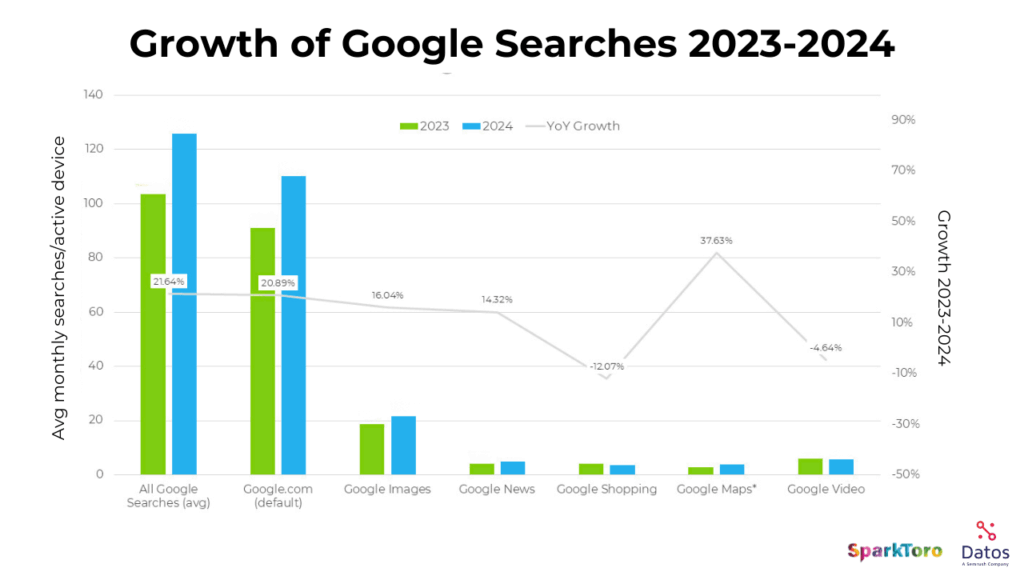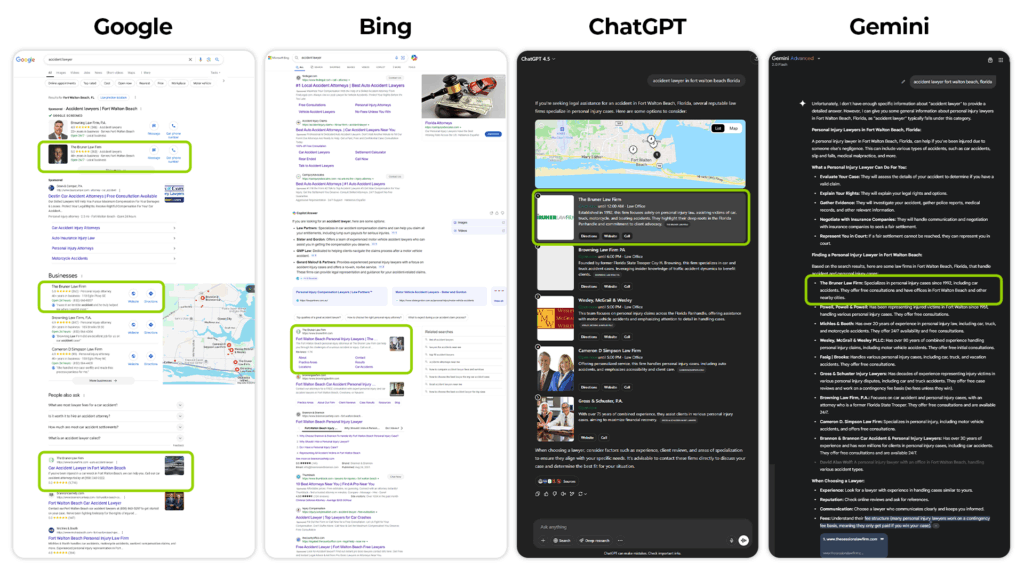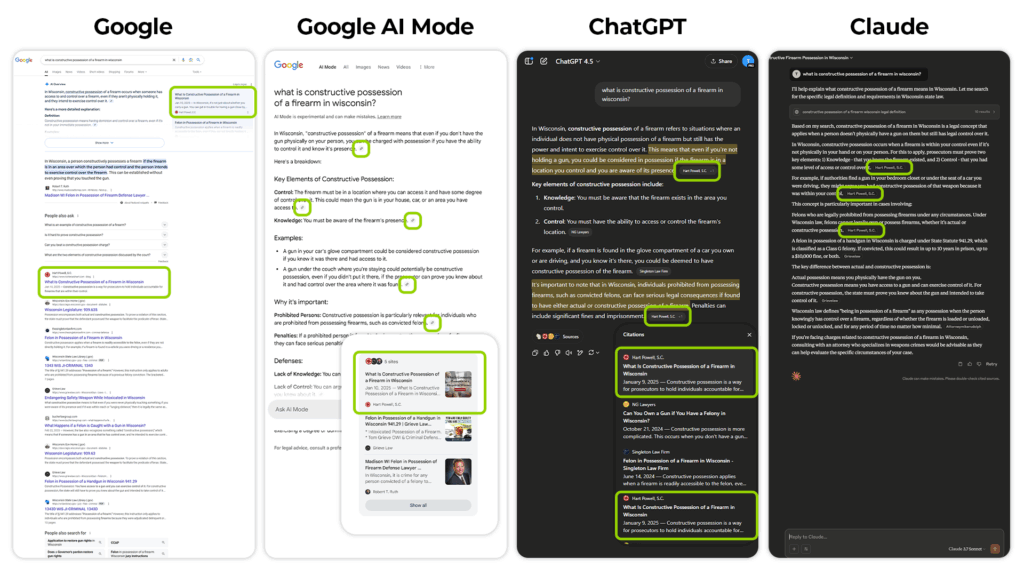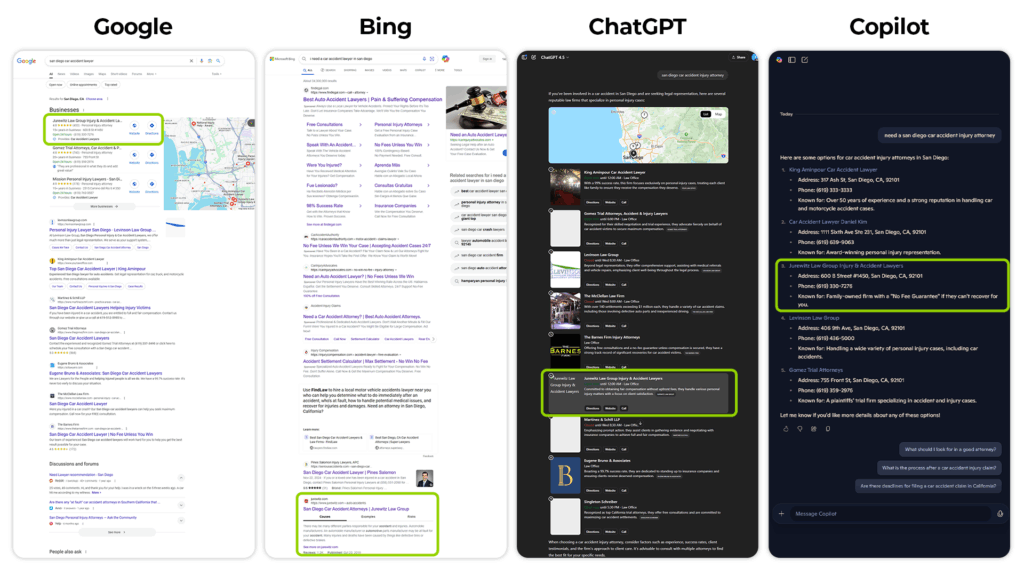
You don’t need to overhaul your entire digital strategy every time a new search tool enters the conversation. But there are some clear moves law firms can make right now to stay competitive in generating cases across both traditional search and AI-generated results.
Here are three examples of firms we partner with who have adopted TSEG’s SEO best practices and are winning across Google, Bing, and AI platforms like ChatGPT, Gemini, and Claude:
In just 2024 alone, Google processed 373 times more searches than ChatGPT. Not only that, but their search volume is still growing. With a 20% bump in search traffic last year, it’s clear that people still turn to Google first when they need answers.

Many law firms assume AI tools like Gemini or ChatGPT are entirely separate search engines. But in reality, those platforms lean heavily on existing search engines’ top-performing content. Investing in strong SEO gets you found on Google AND positions your firm to be discovered across emerging AI platforms, too.
Our take: Google is still where the real case acquisition is–and here’s how winning firms are doing it.
Example: Fort Walton Beach, FL – Personal Injury
A personal injury firm in Fort Walton Beach is dominating local results for “accident lawyer”. Search queries and chat prompts for this broad keyword positioned the law firm prominently across the board:

If your firm only adds content to your homepage and practice area pages, you’re going to struggle to get noticed—by both people and algorithms. According to recent data, over 80% of citations in Google’s AI Overviews come from content-rich pages that are often two or more clicks away from the homepage.
This means that FAQ pages, blog posts, and detailed guides are increasingly important to being discovered online. The firms that are writing specific, in-depth answers to legal questions are the same ones showing up in both traditional search results and complex, AI-generated answers. Think of it as earning the AI tools’ trust before it earns your prospective client’s trust. Taking these steps now will increase the chances that AI tools recommend your firm to users who trust it.
Start with content that answers specific legal questions about your practice areas. Don’t write vague blogs just to fill a checkbox—write posts that respond to what people are wondering about, like “How long do I have to file a workers’ comp claim in Illinois?” These pages have a much better chance of ranking for longer search queries—and being pulled into conversational AI chats and summaries.
Example: Milwaukee, WI – Criminal Defense
A criminal defense law firm in Wisconsin is leveraging detailed legal content to rank and be cited across platforms:

Next, clean up your site’s structure. You should be using schema markups to help search engines and AI tools more quickly understand what your content is about. This behind-the-scenes code improves how your pages appear in search results and makes it more likely they’ll be featured in enhanced listings or AI-generated responses.
With search transitioning to more voice enabled assistants, one key markup to use is speakable schema. As people approach search more conversationally, this is one way to make your website stand out to web crawlers looking for resources to cite in answers to several queries. Having a fast loading website is incredibly important, but adding schema markups to help your site be found and understood more quickly by AI tools can be the difference between appearing in search or being left out completely. Speakable schema is just one small example… There are 815 types of schemas, according to schema.org.
Finally, keep a close eye on how AI search tools evolve. The traffic might be small now, but it’s gradually growing. And the sooner you understand how your content performs across those platforms, the faster you can adjust to stay ahead of your competitors.
Example: San Diego, CA – Car Accident Attorney
A personal injury firm in the highly competitive San Diego market is maximizing high-volume terms like “san diego car accident lawyer”:

When a law firm ranks on Google, that visibility often carries into AI-driven search tools, amplifying their reach across both fronts. That’s a double win for visibility, brand authority, and most importantly, case generation.
Staying competitive in this space requires more than content volume. You need detailed, quality content that answers the right questions, a site that’s structured for both human readers and algorithms, and a strategy that adapts as new tools gain traction.
TSEG works exclusively with law firms to build content and SEO strategies that deliver long-term results. Whether it’s ranking on page one or appearing in AI summaries, we help firms stay visible where it counts most. After 17 years of doing SEO for law firms, we still see the highest return on investment on long-term organic search.
Questions about this new era of search? We’re more than happy to help law firms discover how they can continue generating a steady stream of cases from the internet and search engines. Talk with an SEO specialist at TSEG today.
